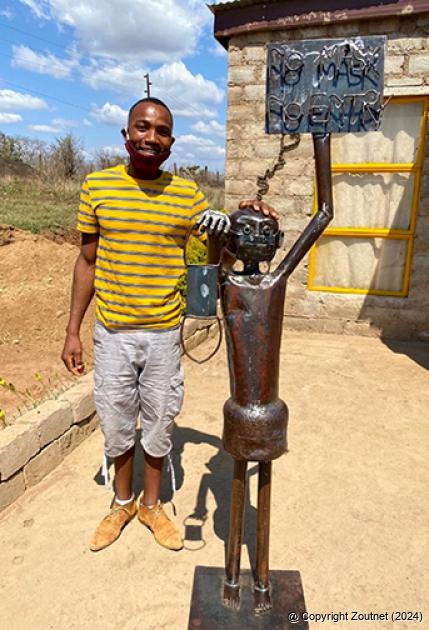

ADVERTISEMENT:

Pilato Bulala is an accomplished local artist famous for fashioning iron matter into enviable pieces of art.
Pilato uses his art to express the pandemic
Pilato Bulala, an accomplished artist famous for fashioning iron matter into creative pieces of art, takes heed of certain elements that affect society when it comes to his art.
In fact, he has taken on the Covid-19 pandemic head-on and creates pieces that are both poignant and inspirational. Pilato’s art, displayed in the courtyard of his home, speaks for itself, and through these creations his understanding of the pain and frustration that the pandemic has brought the world is demonstrated.
“At first I was so frustrated when President Cyril Ramaphosa announced the lockdown in March last year,” he said. “I knew he was doing it all for our good, though. The announcement of the lockdown only made the virus a reality to some of us here in the Vhembe District. We started to realise that this ‘new dangerous thing’ was serious, it was there.”
Like many other South Africans, Pilato had to spend his days and nights in the confines of his yard at Zama-Zama section of Tshivhuyuni village.
“That was when I tapped into my artistic fountain and found that I could express myself more directly in relation to the pandemic. There were more cases in the Vhembe District now and it brought home the reality of Covid-19. I needed to use my art to express my innermost feelings as an artist, and this was more urgent than before.”
Pilato collects discarded cans, iron and other related debris, and fashions them into interesting pieces of art, which make art lovers flood to his studio. His new creations now have a theme.
“I created them with the spirit of an aggrieved artist who wants to see change and healing to the people of the world,” he said. “I created some ‘scraptures’* of different persons in society caught with the coronavirus. The results were iron creations with a touch of poignancy, but my intention was not to create a dark cloud but to depict reality from the soul of the artist. We cannot run away from reality, but we can pray for answers in the form of correct medicine.”
He created an artefact of a woman infected by the coronavirus, and more of other infected people - a doctor, an old woman, and a man. “At another stage, I created one of a doctor carrying a platter of vaccine,” he said. “I felt so happy and optimistic when I created that scrapture. I was sort of saying: hope is there, hope exists.”
Pilato managed to sell lots of those artefacts online, for he had already enjoyed the courtesy of visitors from Germany, England, Holland, and most African countries who had all admired and bought some of his work through the years.
“I thank Madi a Thavha, who continues to promote our art here at Ribola Art Route,” he said. “They arrange visits by art lovers from abroad, who all come to view and buy our art.”
The Ribola Art Route in Mbokota, near Elim, is a celebration of Tsonga, Venda and Shangaan cultures and traditions, celebrated and promoted through art, music, crafts, and the age-old African tradition of storytelling. The route includes regular stops at artists’ studios, art galleries and shops where their arts and crafts are exhibited, thus providing exposure to these talented artists to sell their work.
“I enjoy the kind of popularity and fame that many people only dream of,” Pilato said.
When he started off as an artist, he had no space to store and exhibit his artefacts and figurines. However, he had a sister who let him use the front side of her yard as a display area. Even today, Pilato does not have electricity at home.
“I do most of my work from my brother's place and move them to mine,” he said. “Here at my home is where all my visitors come and find me.”
*According to Madi a Thavha, a hub that promotes artists from the Vhembe region, Pilato had coined the word 'scraptures' because most of his work is made from scrap metal and iron collected from the roadside, scrapyards and the bushes.
Pilato can be followed on Facebook or phoned on Tel 072 343 1202.
Entertainment - Date: 25 April 2021

Recent Articles
-

Vhembe artists wants to unite to revive Tshivenda music
26 April 2024 By Elmon Tshikhudo -

Legendary Solomon Mathase makes music with Dzomo la Venda
25 April 2024 By Elmon Tshikhudo -

Magau's music prophecy gets real
21 April 2024 By Elmon Tshikhudo -

Jah Saint's love of reggae shows
20 April 2024
Search for a story:

ADVERTISEMENT


Tshifhiwa Mukwevho
Tshifhiwa Given Mukwevho was born in 1984 in Madombidzha village, not far from Louis Trichardt in the Limpopo Province. After submitting articles for roughly a year for Limpopo Mirror's youth supplement, Makoya, he started writing for the main newspaper. He is a prolific writer who published his first book, titled A Traumatic Revenge in 2011. It focusses on life on the street and how to survive amidst poverty. His second book titled The Violent Gestures of Life was published in 2014.
Email: [email protected]

ADVERTISEMENT:

